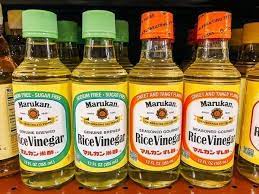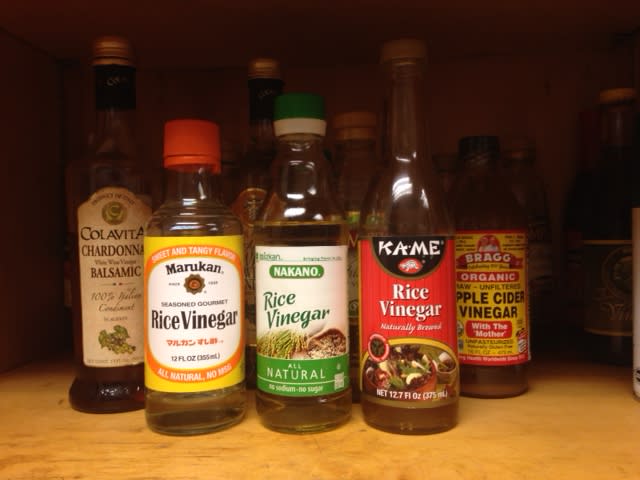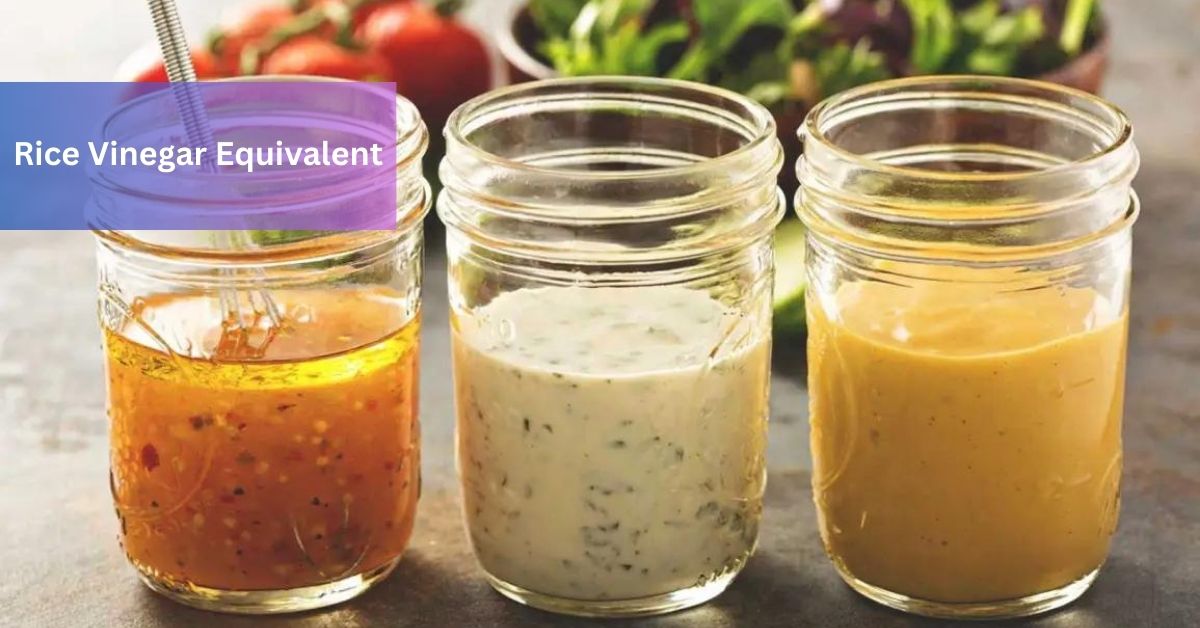Rice Vinegar Equivalent – Elevate Your Dishes To New Heights!
Rice vinegar equivalent” means other things you can use instead of rice vinegar in recipes. If you don’t have rice vinegar or want a different taste, these options help.
Rice vinegar equivalent refers to alternative ingredients that can be used in place of rice vinegar in recipes, such as white wine vinegar, apple cider vinegar, or lemon juice.
Discover the secret sauce to cooking creativity: rice vinegar equivalents unlock endless flavor possibilities in your recipes!
The Basics Of Rice Vinegar – Unlock The Flavor!
Rice vinegar is a versatile ingredient, seamlessly blending acidity and sweetness to enrich a diverse range of culinary creations.
Its prominent role in Asian cuisine is evident in its use in sushi rice, salad dressings, marinades, and dipping sauces.
Renowned for its delicate flavor profile, rice vinegar enhances the taste of dishes without overpowering other ingredients, allowing for a harmonious balance of flavors.
Exploring the world of rice vinegar unveils various varieties, each offering unique nuances to culinary endeavors.
The options are plentiful, from the clear and mild white rice vinegar to the robust and dark black rice vinegar.
However, situations may arise where rice vinegar is not readily available. In such cases, understanding suitable substitutes becomes imperative.
Whether it’s white wine vinegar, apple cider vinegar, or lemon juice, knowing the alternatives ensures that your culinary adventures continue unhindered, with flavors that tantalize the taste buds and elevate every dish to new heights.
Types Of Rice Vinegar – Uncover A Flavorful Journey!

1. White Rice Vinegar:
White rice vinegar is the most commonly used type, known for its clear color and mild flavor. It is made from fermented rice and is often used in pickling, sushi rice, and salad dressings. Its subtle acidity adds brightness to dishes without altering their overall taste.
2. Seasoned Rice Vinegar:
Seasoned rice vinegar is white rice vinegar infused with sugar and salt, giving it a slightly sweeter and tangier flavor profile.
It is commonly used in making sushi rice, marinades, and dressings. The added seasoning enhances the taste of dishes and balances out other flavors.
3. Black Rice Vinegar:
Black rice vinegar, also known as Chinkiang vinegar, originates from China and has a dark color and robust flavor.
It is aged for a longer period, resulting in a deeper, richer taste compared to white rice vinegar. In Chinese cuisine, black rice vinegar is often used in braising, stir-frying, and dipping sauces.
Popular Substitutes – Try Something New!

1. White Wine Vinegar
White wine vinegar is a suitable substitute for rice vinegar due to its mild acidity and clean taste. It works well in salad dressings, marinades, and sauces, providing a similar level of brightness to dishes.
2. Apple Cider Vinegar:
Apple cider vinegar adds a hint of fruity sweetness to dishes, making it a great substitute for rice vinegar in recipes where a slightly sweeter flavor is desired. It pairs well with salads, coleslaws, and pickled vegetables.
3. Champagne Vinegar:
Champagne vinegar is light and delicate, with a subtle flavor that complements many dishes. It can be used interchangeably with rice vinegar in recipes such as vinaigrettes, seafood marinades, and fruit salads.
4. Lemon or Lime Juice:
Fresh lemon or lime juice provides a tangy acidity similar to rice vinegar, adding a refreshing citrus flavor to dishes. It works well in Asian-inspired recipes, seafood dishes, and cocktails.
Tips For Successful Substitutions – Become A Kitchen Pro!

Successfully substituting rice vinegar in recipes requires a few tips and tricks to ensure your dish turns out perfectly.
1. Taste as You Go:
When substituting rice vinegar with another ingredient, taste your dish as you add the substitute to adjust the flavor accordingly.
Remember that different substitutes may vary in acidity and sweetness, so it’s essential to taste and adjust as needed.
2. Adjust Seasoning:
Depending on the substitute used, you may need to adjust the seasoning in your recipe to achieve the desired taste.
For example, if using apple cider vinegar, you may need to adjust the sweetness or saltiness of the dish to balance out the flavor.
3. Consider the Recipe:
Specific recipes may be more forgiving of substitutions than others. Consider the flavor profile of your dish and how the substitute will complement or alter the overall taste.
For example, using lemon juice in a citrusy salad dressing may enhance the brightness of the dish, while using mirin in a savory sauce may add depth and sweetness.
4. Be Mindful of Ingredients:
When making substitutions, be mindful of other ingredients in the recipe and how they interact with the substitute.
For example, if a recipe calls for seasoned rice vinegar containing sugar and salt, you may need to adjust the amount of sugar and salt in the dish when using a different substitute.
FAQS:
1. Why would I need rice vinegar equivalents?
You might find yourself in need of rice vinegar equivalents for various reasons. Whether you’ve run out of rice vinegar or simply desire a different flavor profile in your dishes, having alternative options allows for flexibility and creativity in your cooking endeavors.
2. What are some common rice vinegar substitutes?
Common substitutes for rice vinegar are readily available in most kitchens. White wine vinegar, apple cider vinegar, and lemon juice are popular alternatives that can seamlessly replace rice vinegar in various recipes.
3. How do I know which substitute to use?
When selecting a substitute for rice vinegar, it’s essential to consider your desired flavor profile and the ingredients available in your pantry. The substitute choice depends on various factors, including the specific dish you’re preparing and the flavor profile you aim to achieve.
4. Can I use any vinegar as a substitute for rice vinegar?
While many types of vinegar can substitute rice vinegar, it’s crucial to consider their flavor profiles and acidity levels to ensure they harmonize with your dish. Vinegar vary widely in taste and intensity, ranging from mild and fruity to sharp and tangy.
Conclusion:
Discover versatile alternatives to rice vinegar, such as white wine vinegar, apple cider vinegar, or lemon juice, opening up a world of culinary possibilities and creative experimentation in your kitchen!
Also Read:





